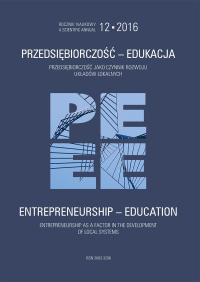Immigrant Entrepreneurship in the EU and OECD Countries
DOI:
https://doi.org/10.24917/20833296.12.24Keywords:
entrepreneurship, immigrant entrepreneurship, migrationAbstract
Determinants of the development of modern economies are associated with globalization processes. One of the key elements of the new economy is migrations. Decisions about migration require overcoming many challenges. The functioning in the new socio-economic conditions becomes challenging, whereas every action is connected with innovation. It can be argued that it requires immigrants to be more entrepreneurial. The combination of phenomena such as migration and entrepreneurship, and consequently the analysis of immigrant entrepreneurship, is becoming an interesting research field. The main objective of the study is to analyze the phenomenon of entrepreneurship among immigrants and to identify important areas for further research in this field. As part of that objective, the article addresses issues related to entrepreneurial behavior and migration. The article is based on available literature review. We can observe some in-depth comprehensive deficiency in the literature. In some countries (e.g. Greece), you will notice a higher rate of self-employment among indigenous people, in others (e.g. Poland) among immigrants. It can be assumed that such a picture is affected on the one hand by the barriers towards entrepreneurial immigrants (capital, legal constraints) and on the other, by the tendency of native residents to run their own businesses. The question is to what extent these differences are the result of entrepreneurial behavior, constraints, formal and legal, forced entrepreneurship. Ascertaining the reasons for migration among immigrant entrepreneurs, including the immigrant nationalities and the industry in which they operate in individual countries, would allow to formulate proper conclusions.References
Ajzen, I. (1991). The theory of planned behavior. Organizational Behavior and Human Decision Processes, 50(2), 179−211.
Biuletyn Migracyjny (2016, 15 stycznia). Ośrodek Badań nad Migracjami UW. Pozyskano z: http://www.biuletynmigracyjny.uw.edu.pl
Clark, W.A.V. (1986). Human migration. Scientific Geography Series, 7.
Domurat, A. (2011). Przedsiębiorczość a kreatywność i innowacyjność. W: A. Strzałecki (red.), Innowacyjna przedsiębiorczość. Teorie. Badania. Zastosowania praktyczne. Perspektywa psychologiczna. Warszawa: Wydawnictwo SWPS „Academica”.
Drucker, P. (1991). Innowacja i przedsiębiorczość – praktyka i zasady. Warszawa: PWE.
Gibb, A.A. (1990). Enterprenurship and intrapreneurship – exploring the differences. W: R. Donckels, A. Miettinen (red.), New findings and perspectives in Entrepreneurship. Aldershot: Awebury Gower Publishing Group, 33−67.
Glinka, B., Gudkova, S. (2011). Przedsiębiorczość. Warszawa: Wolters Kluwer.
Holobinko, A. (2012). Theoretical and methodological approaches to understanding human migration patterns and their utility in forensic human identification cases. Societies, 2, 42−62. DOI: 10.3390/ soc2020042
Internetowa encyklopedia PWN (2015, 17 grudnia). Pozyskano z: http://www.encyklopedia.pwn.pl
IOM (2015). World migration report 2015, migrants and cities: New partnerships to manage mobility. France: International Organization for Migration.
Kahanec, M., Zimmermann, K. (2011). High-skilled immigration policy in Europe. DIW Berlin: Discussion Papers, 1096. DOI: 10.2139/ssrn.1767902
Konieczna-Sałamatin, J. (red.). (2015). Imigranci o wysokich kwalifikacjach na polskim rynku pracy. Badanie społeczne. Warszawa: Instytut Społeczno-Ekonomicznych Ekspertyz, Fundacja „Nasz Wybor”.
Kosała, M. (2014). Badanie postaw przedsiębiorczych wśród młodzieży jako fundament kształtowania postawy odpowiadającej wyzwaniom współczesnego świata. Horyzonty Wychowania, 13(2), 317−340.
Kosała, M., Pichur, A. (2008). Analiza działań przedsiębiorczych i postrzeganie prowadzenia działalności gospodarczej wśród młodego pokolenia – wybrane aspekty. Przedsiębiorczość – Edukacja, 4, 347−354.
Lucassen, J., Lucassen, L., Mannin, P. (red.). (2010). Migration history in world history: Multidisciplinary approaches. Leiden and Boston: Brill.
Marucci, M., Montedoro, C. (2010). L’integrazione degli immigrati tra politiche attive del lavoro e politiche sociali: esperienze ed eccellenze in quattro regioni italiane. Strumenti ISFOL, 6. W: The missing Entrepreneurs 2015: Policies for self-employment and Entrepreneurship. Paris: OECD Publishing. DOI: 10.1787/9789264226418-en
Ndofor, H., Priem, R. (2011). Immigrant Entrepreneurs, the ethnic enclave strategy, and venture performance. Journal of Management, 37(3), 790−818.
OECD (2010a). Entrepreneurship and migrants. Report by the OECD working party on SMEs and Entrepreneurship. Paris: OECD Publications.
OECD (2010b). Open for business: migrant Entrepreneurship in OECD countries. Paris: OECD Publishing. DOI: 10.1787/9789264095830-en
OECD (2015). . PThe missing Entrepreneurs 2015: Policies for self-employment and Entrepreneurshiparis: OECD Publishing.
Piasecki, B. (1997). Przedsiębiorczość i mała firma – teoria i praktyka. Łódź: Wydawnictwo Naukowe UŁ.
Targalski, J., Kosała, M., Pichur, A. (2007). Postawy przedsiębiorcze wśrod studentow kierunku ekonomia Akademii Ekonomicznej w Krakowie – analiza wyników badań. W: P. Wachowiak, M. Dąbrowski, B. Majewski (red.), Kształtowanie postaw przedsiębiorczych a edukacja ekonomiczna. Warszawa: Fundacja Promocji i Akredytacji Kierunków Ekonomicznych, 90−100.
Wach, K. (2013). Edukacja na rzecz przedsiębiorczości wobec współczesnych wyzwań cywilizacyjno-gospodarczych. Przedsiębiorczość – Edukacja, 8, 246−257.
Wach, K. (2015a). Przedsiębiorczość jako czynnik rozwoju społeczno-gospodarczego: przegląd literatury. Przedsiębiorczość − Edukacja, 11, 24−36.
Wach, K. (2015b). Środowisko biznesu rodzinnego jako stymulanta intencji przedsiębiorczych młodzieży akademickiej. Przedsiębiorczość i Zarządzanie, 16(7/3), 25−40.
Włoch, R. (2015). Przegląd literatury przedmiotu i badań empirycznych. W: J. Konieczna-Sałamatin (red.), Imigranci o wysokich kwalifikacjach na polskim rynku pracy. Badanie społeczne. Warszawa: ISEE, Fundacja „Nasz Wybór”, 17−60.
Downloads
Published
How to Cite
Issue
Section
License
Articles are published under the terms of the Creative Commons License (CC BY-ND 4.0; Attribution– NoDerivs).

